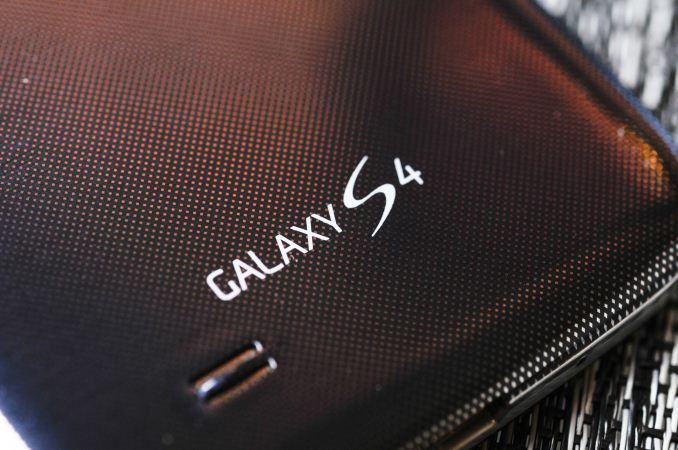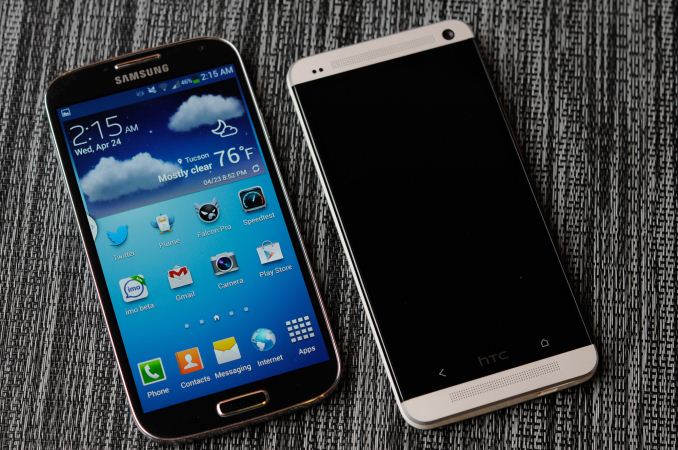Samsung Galaxy S 4 Review - Part 1
by Brian Klug on April 24, 2013 12:01 AM ESTFinal Words
Samsung has done a tremendous job creating a global following not only for its brand, but also for its software. In studying Samsung and its devices it becomes quite clear that although many enthusiasts yearn for pure, unadulterated Android, there are seemingly big pockets of the market who have grown used to (and maybe even desire?) Samsung's TouchWiz user experience. It really is a very clever strategy on Samsung's part. If you deliver products that your users appreciate, and deliver a uniquely different user interface at the same time, you begin to create an appreciation for that user interface as well. All of this flies in the face of what we as reviewers normally seem to prefer, but Samsung's success is proof of the fact that not everyone absolutely detests OEM customized Android.
Samsung's existing user base is likely the easiest to talk to about the Galaxy S 4. Compared to any previous Galaxy S device, the SGS4 is a clear step forward in all of the right areas. The display is higher resolution, the SoC is significantly faster, there's better WiFi (and connectivity depending on what generation of Galaxy S you're talking about) and obviously the Galaxy S 4 runs the absolute latest version of Android. Even on the camera side, Samsung has improved imaging performance over the Galaxy S 3 this generation thanks to its use of a wider aperture lens system. If you're a happy owner of a Samsung Galaxy S/S2/S3, you'll likely be a happy owner of a Galaxy S 4.
It's when you compare the Galaxy S 4 to its chief technical competitor, the HTC One, that the discussion becomes more complicated. HTC and Samsung take very different approaches to nearly every aspect of their flagship smartphones. Whether it's display (LCD vs. Super AMOLED), camera (low light vs. well lit performance), or software (subtle Sense 5 or feature filled TouchWiz), you couldn't pick two more different players in the Android space. So which is better?
It really depends on what you value more. The One's camera delivers better low light performance, while the Galaxy S 4's camera delivers better performance in well lit (e.g. outdoor) scenarios. The One's software customizations are definitely more subtle and out of your way, while Samsung's approach is much more feature overload and in your face. It's difficult to say for sure given our Sprint review unit, but HTC likely gets the slight edge in battery life based on our results here today (although these two devices can be close competitors depending on the workload). Samsung does integrate the faster SoC, despite both the Galaxy S 4 and HTC One shipping the same Snapdragon 600 platform. Samsung and HTC remain on opposite sides of the removable battery/microSD fence, if those two things matter to you then Samsung is the obvious choice. Finally there's a question of how much you value/desire an all-metal smartphone. For some, Samsung's choice in materials is going to continue to be a very big issue.
At the end of the day, the Galaxy S 4 is an evolution of the Galaxy S 3 in pretty much all of the areas you'd expect it to be. Whether or not that's what you wanted in a new Android smartphone is going to vary from one person to the next. The good news is that you at least have a choice.












335 Comments
View All Comments
Solandri - Thursday, April 25, 2013 - link
Structural engineer here. The reasons Roffles12 cited are valid, objective engineering reasons to use plastic over metal. When you're designing an item and selecting what material it's made of, a myriad of factors come into play including: elastic modulus (flexibility), toughness (ability to withstand piercing), hysteresis (energy absorbed during bending vs. energy bounced back), yield strength (how much stress it can take before it breaks), fatigue (tendency for cracks to grow), fracture strength (tendency for cracks to propagate), corrosion resistance, heat and electrical conductivity, thermal expansion, weight, density, and yes cost.For a phone with an expected 2-3 year lifespan (plastic tends to get brittle after many years), plastic is actually superior to metal in many of these characteristics. A similar thing happened in the 1940s and 1950s with cars. As they got faster, more people were dying in accidents. Automakers responded by building the cars stronger and stronger, and more people died. Finally they took a step back and did some crash testing, and found that making the exterior stronger was actually the *worst* thing they could do to protect the people inside. It transmitted all the impact forces directly to the occupants. Now they build cars with crumple zones which bend and yield to absorb the energy of an impact, while a stiff passenger compartment protects the occupants. Similarly, if designed right, a phone with a flexible plastic exterior but a strong interior construction can survive impacts better than one with a stiff metal exterior.
Unfortunately, for most of the uneducated masses, their analysis is much simpler: metal = good, plastic = cheap. Which is really too bad since it will lead to them making a lot of non-optimal purchase decisions. About the only plastic which has escaped this stereotype is carbon fiber, which is just strengthening fibers embedded in a plastic substrate. Probably because the stuff is expensive, and most people automatically assume expensive = good.
UpSpin - Thursday, April 25, 2013 - link
I normally don't sit in my smartphone and throw it with 100 km/h against a wall. And I don't know a car made out of plastic, the cars I drive are made out of steel and aluminum and last more than 10 years.I don't understand what you want to tell us at all with your car story, because it's not related to smartphones at all.
You also forget that the front of the smartphone consists of glass! which breaks easily. So if your body is highly flexible and very soft, it won't break, but your glass will have to absorb the whole energy and break. And as you can see in the S4 photos, there is barely a bezel thus no 'crush zone'.
You also don't buy a rugged device which must withstand permanent drops. (I haven't dropped my 3 years old smartphone even once).
I agree with you that plastic has its advantages compared to metal but so does metal compared to plastic. Plastic is more flexible which is negligible because the glass isn't flexible. Plastic breaks easily, wheras metal deforms, whatever you prefer.
And as you said, plastic is a broad term. You can find cheap and expensive variants (Kevlar, carbon fiber), with different properties (soft, hard, ...) and different finishes (matt, glossy).
But the plastic (or let's say polycarbonate) Samsung uses is shiny, glossy, cheap.
nerd1 - Thursday, April 25, 2013 - link
Phones get dropped on hard surfaces a lot during its lifetime. Metal gets dent, while polycarbonate ( which is NOT cheap material) absorbs the shock and keeps its shape. If you are gonna baby your phone you may be fine with metal exterior but I do not.gnx - Friday, April 26, 2013 - link
Actually it's not the plastic per se but the additional gloss that makes is bad. The plastic that Samsung uses in their phones is quite high grade, very flexible, very durable. The problem is the shiny gloss they put on top of it. I think in an interview Samsung said they add the glossy finish cause it prevents scratches and provides a halo effect. Both personally dislike both, since the instead of scratches it attracts finger prints, and the halo effect is just distracting. I wouldn't mind plastic at all, even prefer if, plastic if they'd leave it matte.Osamede - Friday, April 26, 2013 - link
"...You also forget that the front of the smartphone consists of glass! which breaks easily. So if your body is highly flexible and very soft, it won't break, but your glass will have to absorb the whole energy and break...."- This is not accurate. The idea is that the body absorbs energy and transmits less of it. The more solid and less flexible the body, the more the body will transmit the energy further forwarding it to the glass.
"Plastic is more flexible which is negligible because the glass isn't flexible. Plastic breaks easily, wheras metal deforms, whatever you prefer..."
- this is a gross generalization. Metals come in a huge range of properties. Some metals are also brittle (what you refer to as "breaks easily". Even the same metal can be more or less brittle depending on if it is cast or extruded or treated in various ways.
We cant just go around equating looks to durabiity. I can show you plastic body Nokias I have in my drawer that lasted years and could last another half decade if I take it out and use it today. Plastic body with a metal frame under or even just plastic body/frame can be highly effective and long lasting in protecting what's inside, even if it scratches.
We need to stop generalizing like this. It's beyond shallow. This is engineering - there are many ways to skin a cat and acheive a specific type of durability, at various tradeoffs and price points.
If you like the phone - fine, buy it. If you dont, then hey buy what you like. Free choic.
A_Smith - Thursday, April 25, 2013 - link
Features and other specs wise this phone is on top, but I'm not happy with its design. Samsung has kept rolling their newer model with almost similar designs for years now. Aren't they planning to modify their smartphone designs?Jaegs - Thursday, April 25, 2013 - link
Anandtech doesn't do review scores so we have to use "Klug Pages"HTC One is 17
Galaxy S4 is 9
ShieTar - Thursday, April 25, 2013 - link
I am somewhat surprised that the articles does not discuss the apparently protruding camera optics in more detail. I have a Huawei Mediapad with a similar protruding lens fixation, and it is rather annoying because it wobbles around if you lay it down on a table. For me that is actually a relevant point, even for a phone. About 7 hours a day, the phone is lying on my table while I work, and if a text or Mail comes in, I don't actually pick it up, but rather just operate it on the table.Is this possible with the Samsung, or is the protruding optics a problem?
I also wish that someone would make a great smartphone without cameras, which I never used in my life, but I'm getting the distinct feeling that I am the only person alive with that problem.
richy184 - Thursday, April 25, 2013 - link
Yep, HTC One for me. GS4 is just too cheap and tacky looking (software and hardware) with too many gimmicky features ill never ever use.krumme - Thursday, April 25, 2013 - link
I am surprised Brian had an micro sd card :) - naughty